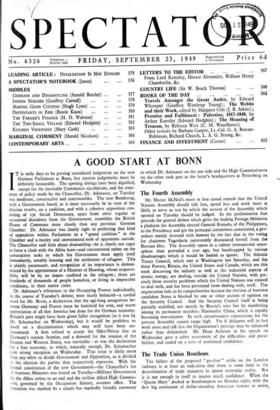The Fourth Assembly
Mr. Hector McNeil's more or less casual remark that the United Nations Assembly should talk less, spend less and work more is likely to serve as test by which the session of the Assembly which opened on Tuesday should be judged. In the preliminaries that precede the general debate which gives the leading Foreign Ministers a platform the Assembly elected General Romulo, of the Philippines, to the Presidency and got the principal committees constituted, a pro- cedure mainly invested with interest by the fact that in the voting for chairmen Yugoslavia consistently dissociated herself from the Russian bloc. The Assembly opens in a calmer international atmo- sphere than prevailed a year ago, but handicapped by various disadvantages which it would be foolish to ignore. The Atlantio Treaty Council, which met at Washington last Saturday, and the three Powers, Britain, the United States and Canada, which are this week discussing the military as well as the industrial aspects of atomic energy, are dealing, outside the United Nations, with pre- cisely those security problems which the United Nations was created to deal with, and has been prevented from dealing with, itself. The organisation fails to be comprehensive because the election of fourteen candidate States is blocked by one or other section of opinion on the Security Council. And the Security Council itself is being partially stultified, not merely by Russia's veto but by numbering among its permanent members Nationalist China, which is rapidly becoming non-existent. In such circumstances expectations for the present Assembly cannot range high. Yet if delegates will in fact work more and talk less the Organisation's prestige may be enhanced rather than diminished. Mr. Dean Acheson in his speech on Wednesday gave a sober assessment of the difficulties and possi- bilities, and ended on a note of restrained confidence.


































